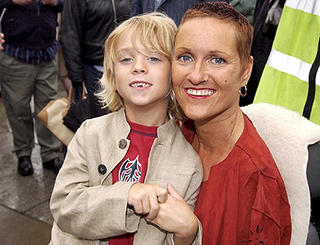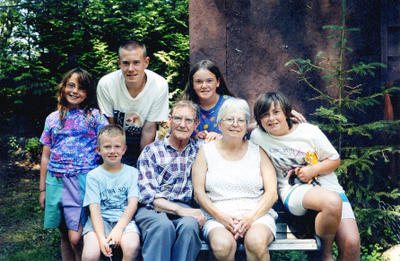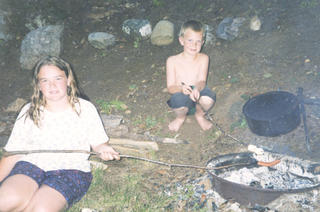Time for a change of pace. I have one more subject I'd like to address with respect to Hurricane Katrina, but people may want to take a break and think about something else.
Imagine it's a Friday afternoon at the end of a demanding week. What are you looking forward to doing:
- (a) meeting several friends at a trendy pub?; or
(b) retreating to a corner of the house for a quiet read?
According to
Carl Jung, there are two kinds of people in the world: introverts and extroverts (alternative spelling, extraverts). Sometimes I think the divide between these two groups is as great as the divide between men and women. We understand each other's perspectives only dimly and with much effort.
Back on August 22, I published the post,
Most overrated virtue. I wrote,
- Western society rewards extroverts over introverts virtually every time. People respond to it as a great virtue even if they haven't explicitly thought of it in those terms.
I think introverts have a great deal to contribute to society, though I am not saying that introverts are better than extroverts. As in most areas, I think balance is a healthy ideal … and I think our society is unbalanced in favour of extroverts.
The post didn't provoke much of a reaction until Bill returned from vacation some days later. He responded:
- I disagree on extroversion being overrated.
Extroversion allows the extrovert to connect with society as a whole in a much more concrete way. The extrovert might have 100 personal interactions a day and if only 10 percent are quality connections then he/she has connected in a very concrete way to 10 people per day, 3500 people per year, and millions in a life time.
The introvert is lucky if he/she makes 5 special friends in a life time. I have rarely met a lonely extrovert but I know many lonely introverts.
It is my impression that some bad blood is rising to the surface here. Introverts and extroverts simply don't understand one another. As usual, where misunderstanding abounds, each side is guilty of offending the other.
I would like to promote greater harmony between these two alien beings. I can't speak for the extroverts of the world; perhaps one of my readers can take up the challenge and post on
The misunderstood extrovert. But I can speak on behalf of introverts and attempt to clear away some misperceptions.
1. Introverted ≠ socially incompetent:Admittedly, introverts may be clumsy in social situations. An introvert may have trouble initiating a conversation or maintaining it. She may seize up with anxiety or embarrassment and come across as dull or disinterested.
But introverts are not all socially incompetent. Some introverts have learned that you can initiate a conversation with something as simple as a warm smile coupled with direct eye contact. They've learned to stay abreast of current issues, so they'll have something of interest to say at a party. They've learned not to panic when there's a lull in the conversation (because conversations have a natural ebb and flow to them). And they've learned to ask the other person a question about themselves if the lull continues too long and they can't think of anything interesting to say.
In other words, they've developed some adaptive behaviours to compensate for their native uneasiness in a crowd.
Similarly,
introverted is not the same thing as
shy. I am an introvert, but I am also a reasonably good public speaker. I'm not very good at extemporizing, but if I have adequate time to prepare I am quite capable of engaging people's attention and getting a message across.
My ex-wife is a raging extrovert. But, to my surprise, I discovered there was one social situation where I was more comfortable than she was.
I was the pastor of a church for about four years. It was a small church, and I did my best to turn that into a virtue by emphasizing personal contact with folks. Each Sunday, before the worship service started, I would walk around and greet people where they sat in the pews.
I was perfectly comfortable in that role, but for some reason my ex-wife wasn't. She could have just stayed at my elbow and let me lead, but she found the whole exercise awkward and uncomfortable.
I never did figure out why it was an issue for her, but it was good for my ego. Despite my introversion (and her extroversion), I was more at ease and adept in that social situation than she was.
2. Introverted ≠ distant or aloof:Here I want to call your attention to the intimacy paradox. (As far as I know, I have just coined the expression.)
Even Mary P. finds this subject confusing. I tell her that I have a deep need for human contact, and she just shoots me that look. You know the look I mean; the same look an entomologist might use to study an unfamiliar insect. Behind the clinical expression, she's calculating how to respond:
It can be dangerous to contradict delusional people. Perhaps it would be safer to play along with Q and pretend that he's making sense.It surprises me that the intimacy paradox surprises Mary P. It is, in fact, the foundation of our relationship. Mary P. and I both have an extraordinary need for intimacy. We spend many hours deep in conversation. And I do not exaggerate when I say that those conversations are life to me.
This is not typical of all introverts, I admit. Some people are completely self-contained; they have no need of human companionship. (I'll return to this observation and offer another comment on it below.)
But I think it is more typical for introverts to have an inner drive toward intimacy. Introverts are not distant or aloof. They need fewer relationships than extroverts, but they desire a profound degree of intimacy in the relationships they do form.
Bill estimates that he has 100 personal interactions per day, and 10 of those are quality interactions. Mary P. responded:
- Introverts and extroverts define "quality" quite differently. Something you, as an extrovert would define as a quality interaction, I would see as just beginning to show the potential for quality.
As an introvert, I'd say that if you were having as many as 100 interactions in a day, there would simply not be the time for any of them to be "quality". You would see it otherwise, because your definition of the word differs from mine.
And this is the critical point. Who defines the quality of a friendship? Obviously, the parties to that friendship.
Intimacy is not a prerequisite of a "quality" friendship; not the way that Bill defines "quality". And he should define his friendships in the way that best suits him.
The intimacy paradox is,
introverts require more intimacy than extroverts. If I had ten "quality" friendships at the same time, I'd see it as an embarrassment of riches. And I probably couldn't maintain them all. I'd find it too demanding; it would be more than I could give of myself.
3. The defining characteristic of an introvert:According to
Myers-Briggs, introverts
direct their energy to the inner world of thoughts and emotions and
derive energy back from that inner world of thoughts and emotions. Extroverts, on the other hand, direct their energy to the outer world of people and things and receive energy back from that source.
I would emphasize the second half of the definition and ask,
Where do you get your energy from? In my view, this is the best way to distinguish an introvert from an extrovert.
This, too, was a lesson I learned in my first marriage. My ex-wife gained energy in proportion to the social demands we were facing. At Christmas time, when we faced multiple demands from church, family, and friends, she was in her glory. But I found it exhausting. I just wanted to crawl into a hole somewhere til Christmas was over.
Not an ideal quality in a pastor, by the way.
I get energy from turning inward. Long before I encountered Myers-Briggs, I said that I needed to be "alone in my own head".
This is not to say that I don't enjoy socializing. We live on a very social street, and I love it. I think it's great that people sit on their front porches and holler to one another across the street, or invite each other over for a drink. I gain a certain amount of energy from that dynamic … but mostly vicariously. I only participate to a limited extent.
I like to think that I am friendly, but it's probably more accurate to say that I am not unfriendly. I socialize in short bursts; then I feel a need to retreat.
Regrettably, even though I enjoy socializing, I don't find it reenergizing: I find it taxing. I sincerely wish it wasn't so, but it's just the way I'm "wired". If I don't spend a certain amount of time alone in my own head I begin to get depressed.
There is one exception to the general rule: my relationship with Mary P. I find it reenergizing to spend time with her, exploring "the inner world of thoughts and emotions" jointly.
And this brings me back to the observation I made earlier, that some people are completely self-contained. I think there are two kinds of introvert: those who are content to explore the inner world of thoughts and emotions solo, and those who want to share that voyage of discovery with someone else.
I'm in the latter camp. A quality friendship, for me, is a relationship where we can explore the inner world of thoughts and emotions jointly.
Conclusion:Let's return to the question I asked at the beginning of this post. Imagine it's a Friday afternoon at the end of a demanding week. What are you looking forward to doing:
- (a) meeting several friends at a trendy pub?; or
(b) retreating to a corner of the house for a quiet read?
If you answered (a), you're an extrovert. When you're exhausted, you want to socialize in order to reenergize.
If you answered (b), you're an introvert. When you're exhausted, you want to turn inward to your thoughts and emotions.
But
introverted is not equivalent to
socially incompetent or
shy; nor is it equivalent to
distant or
aloof. On the contrary, introverts can be socially adept, good public speakers, and highly interested in intimacy.
The key distinction is the one I've emphasized: when you're exhausted, how do you reenergize?
I'll be watching for someone to respond with a corresponding post,
The misunderstood extrovert.





























